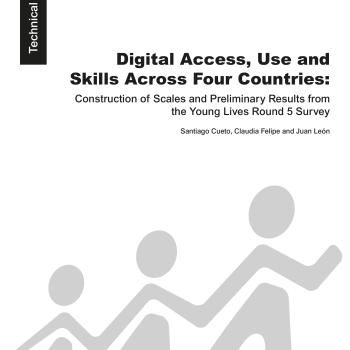
This technical note outlines the procedures used to develop a digital module, administered to both Young Lives cohorts in the four study countries during the Round 5 household survey in 2016. The modules were based on existing scales in this field. We carried out pilot tests of instruments and performed psychometric analysis to present evidence of the reliability and validity of the instruments. The items measure access, digital skills and use of digital devices, including computers, tablets, the internet and mobile phones. This note provides measures of computer (offline) and internet skills, estimated through factor analysis.
Descriptive results show a clear digital divide across countries, with respondents in Peru and Vietnam showing higher levels of access, more frequent use, and earlier age of engagement with digital devices than respondents in Ethiopia and India. However, in a multivariate analysis we found that within countries there are differences in access associated with socio-economic status; for example, the wealth index (collected in Round 1 of Young Lives in 2001) predicts access to computers 15 years later, as do maternal education and ethnicity. In some cases, gender (favouring males, particularly in India) is also predictive of access. We also found that starting to use computers and the internet earlier, and using them daily, was associated with higher levels of digital skills in both cohorts for most countries.

This technical note outlines the procedures used to develop a digital module, administered to both Young Lives cohorts in the four study countries during the Round 5 household survey in 2016. The modules were based on existing scales in this field. We carried out pilot tests of instruments and performed psychometric analysis to present evidence of the reliability and validity of the instruments. The items measure access, digital skills and use of digital devices, including computers, tablets, the internet and mobile phones. This note provides measures of computer (offline) and internet skills, estimated through factor analysis.
Descriptive results show a clear digital divide across countries, with respondents in Peru and Vietnam showing higher levels of access, more frequent use, and earlier age of engagement with digital devices than respondents in Ethiopia and India. However, in a multivariate analysis we found that within countries there are differences in access associated with socio-economic status; for example, the wealth index (collected in Round 1 of Young Lives in 2001) predicts access to computers 15 years later, as do maternal education and ethnicity. In some cases, gender (favouring males, particularly in India) is also predictive of access. We also found that starting to use computers and the internet earlier, and using them daily, was associated with higher levels of digital skills in both cohorts for most countries.

